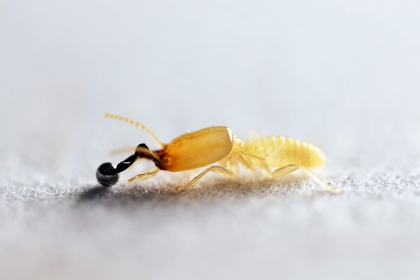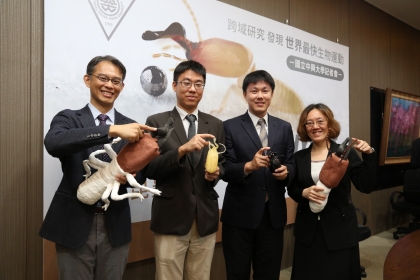Termite’s twisted mandible renews the fastest animal movement on record
2020-06-19
興新聞張貼者
Unit秘書室
3,272
Finding the extremes in biology is fascinating, in particular, the fastest animal on the planet. Combining ultra-high speed videography and ball-strike experiments, researchers in Taiwan uncover that the twisted left mandible of Pericapritermes nitobei termite soldiers can snap at a speed of 132 m/s (equivalent of 475 kph), breaking the record 111 m/s set by the ants. The findings of such fast, powerful, and precise strikes are reported in Scientific Reports .
Unlike most defensive mandibles in termites or ants, the soldiers of some soil-feeding termites have twisted left mandibles. For century, biologists have speculated that such highly asymmetric mandibles can snap to generate rapid movements, even outperforming those of most termites. However, because of small size, fast motion, locality in tropics/ subtropics, and difficulty to maintain in the laboratory, the snapping performance and mechanics of the twisted-mandible termites remain a mystery.
The team, collaborating between Entomology and Physics of National Chung Hsing University in Taiwan, began to film the twisted-mandible termite Pericapritermes nitobei by using their own high speed video camera, but failed to capture the snapping motion at 1000 frames per second. To estimate the snapping speed, the team instead designed a “ball-strike experiment” and applied mechanical concept (the principle of energy conservation) to estimate the snapping speed of the twisted mandibles. This method, assuming no energy loss hence underestimating speeds, yielded results that approach the previous record set by the ants. Filming by a borrowed ultra-high speed camera, the team confirmed that within 1/50000 second, the twisted left mandible can snap at 132 m/s, which is 20% increase of speed within 40% less time than the previous record.
The team also analyzed the mandible’s aiming ability and effects against different ant predators. The results reveal that the twisted mandible of termite soldier is a fast, powerful, and precise ballistic weaponry for defending tunnels.
The team’s future work includes examining the deformation, material, and structural properties of termite’s twisted mandibles more thoroughly to understand why they can outperform symmetric mandibles.
Unlike most defensive mandibles in termites or ants, the soldiers of some soil-feeding termites have twisted left mandibles. For century, biologists have speculated that such highly asymmetric mandibles can snap to generate rapid movements, even outperforming those of most termites. However, because of small size, fast motion, locality in tropics/ subtropics, and difficulty to maintain in the laboratory, the snapping performance and mechanics of the twisted-mandible termites remain a mystery.
The team, collaborating between Entomology and Physics of National Chung Hsing University in Taiwan, began to film the twisted-mandible termite Pericapritermes nitobei by using their own high speed video camera, but failed to capture the snapping motion at 1000 frames per second. To estimate the snapping speed, the team instead designed a “ball-strike experiment” and applied mechanical concept (the principle of energy conservation) to estimate the snapping speed of the twisted mandibles. This method, assuming no energy loss hence underestimating speeds, yielded results that approach the previous record set by the ants. Filming by a borrowed ultra-high speed camera, the team confirmed that within 1/50000 second, the twisted left mandible can snap at 132 m/s, which is 20% increase of speed within 40% less time than the previous record.
The team also analyzed the mandible’s aiming ability and effects against different ant predators. The results reveal that the twisted mandible of termite soldier is a fast, powerful, and precise ballistic weaponry for defending tunnels.
The team’s future work includes examining the deformation, material, and structural properties of termite’s twisted mandibles more thoroughly to understand why they can outperform symmetric mandibles.




